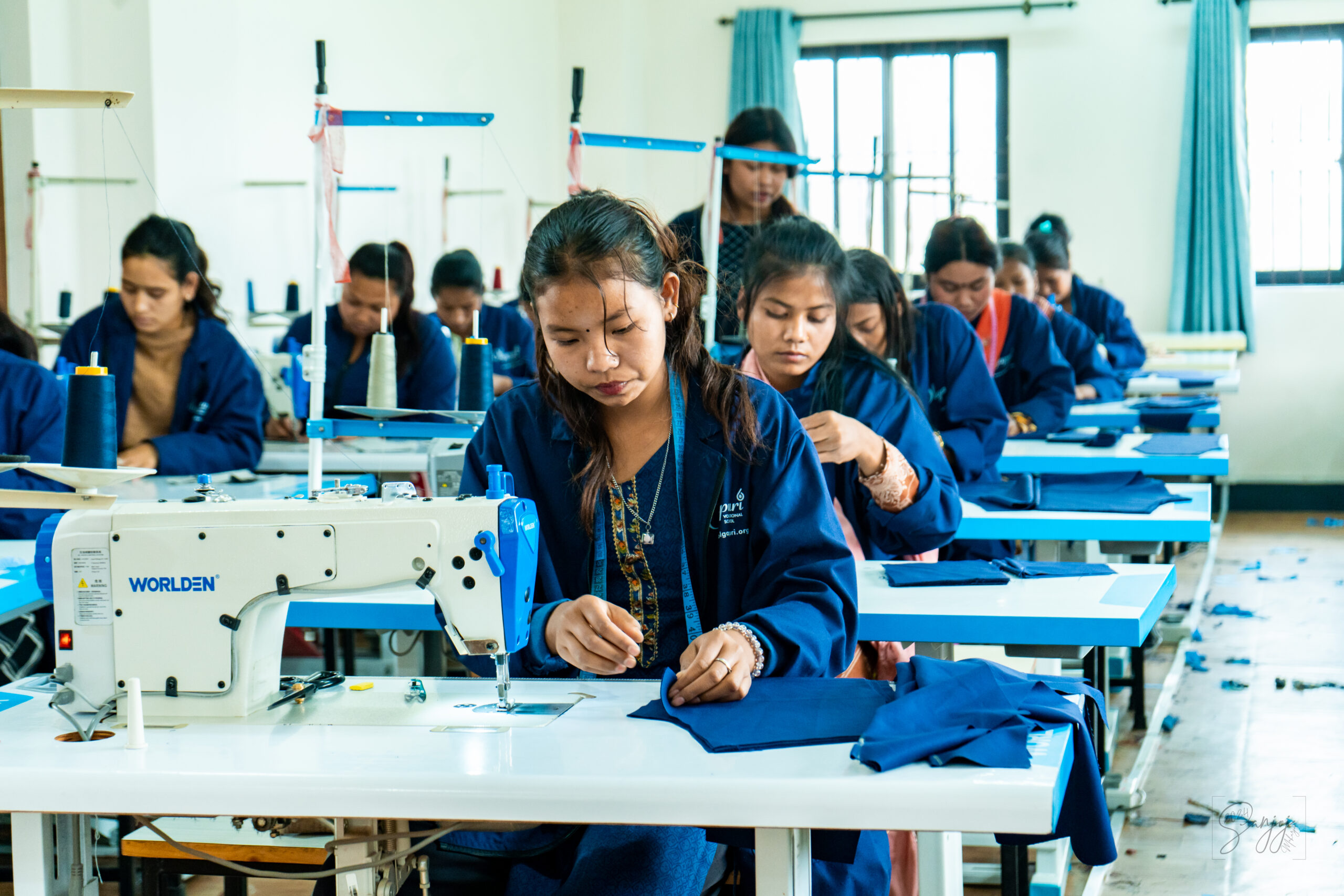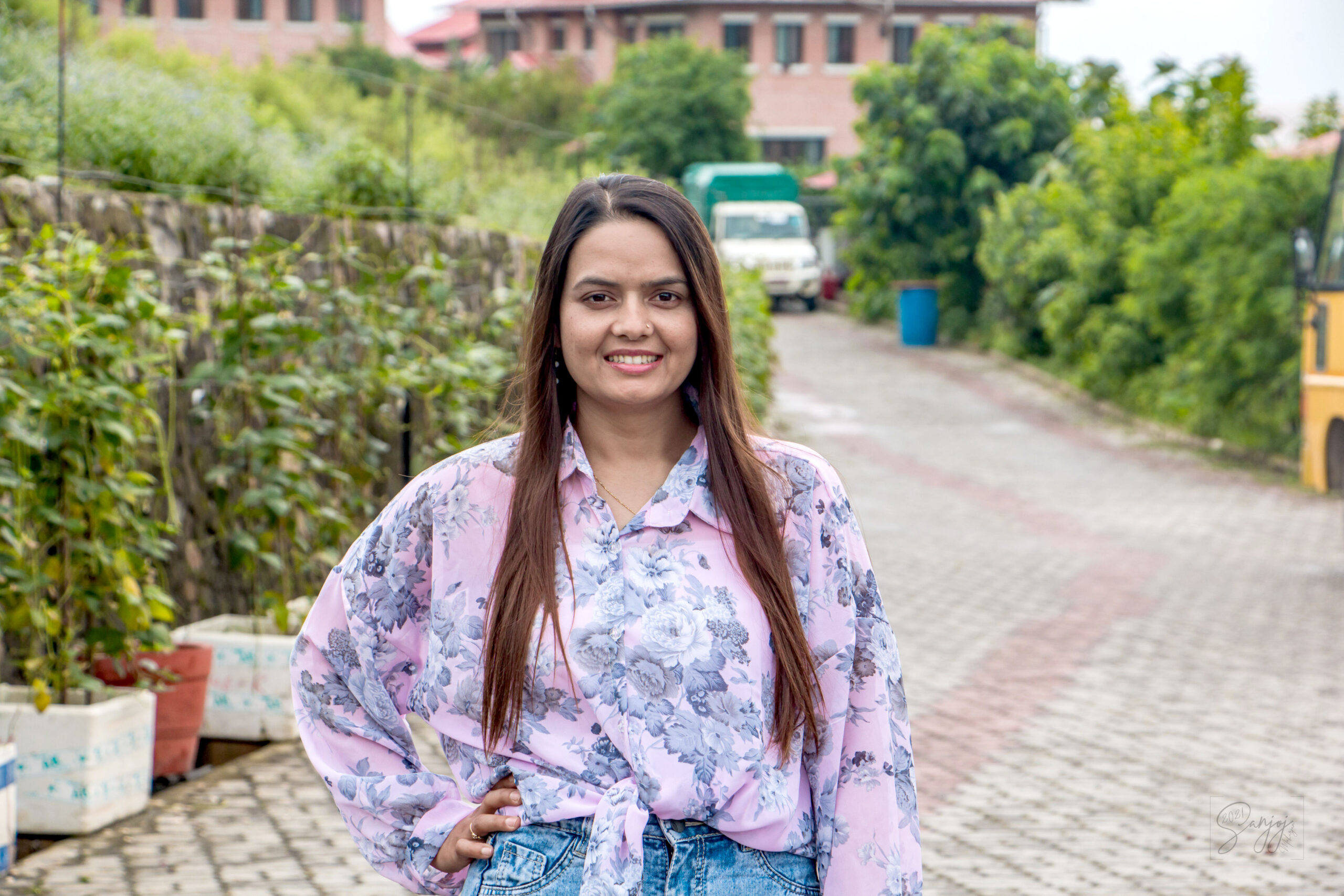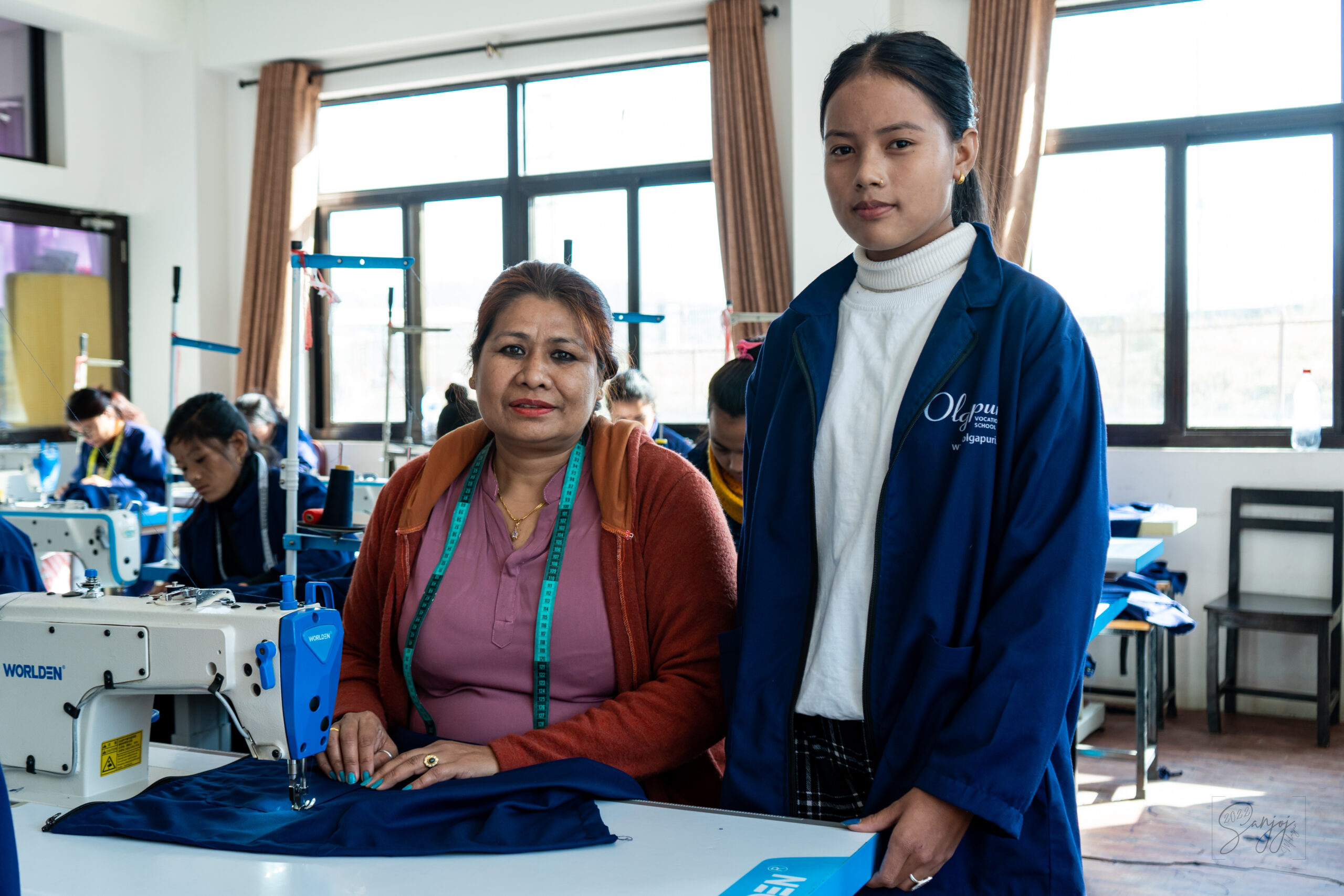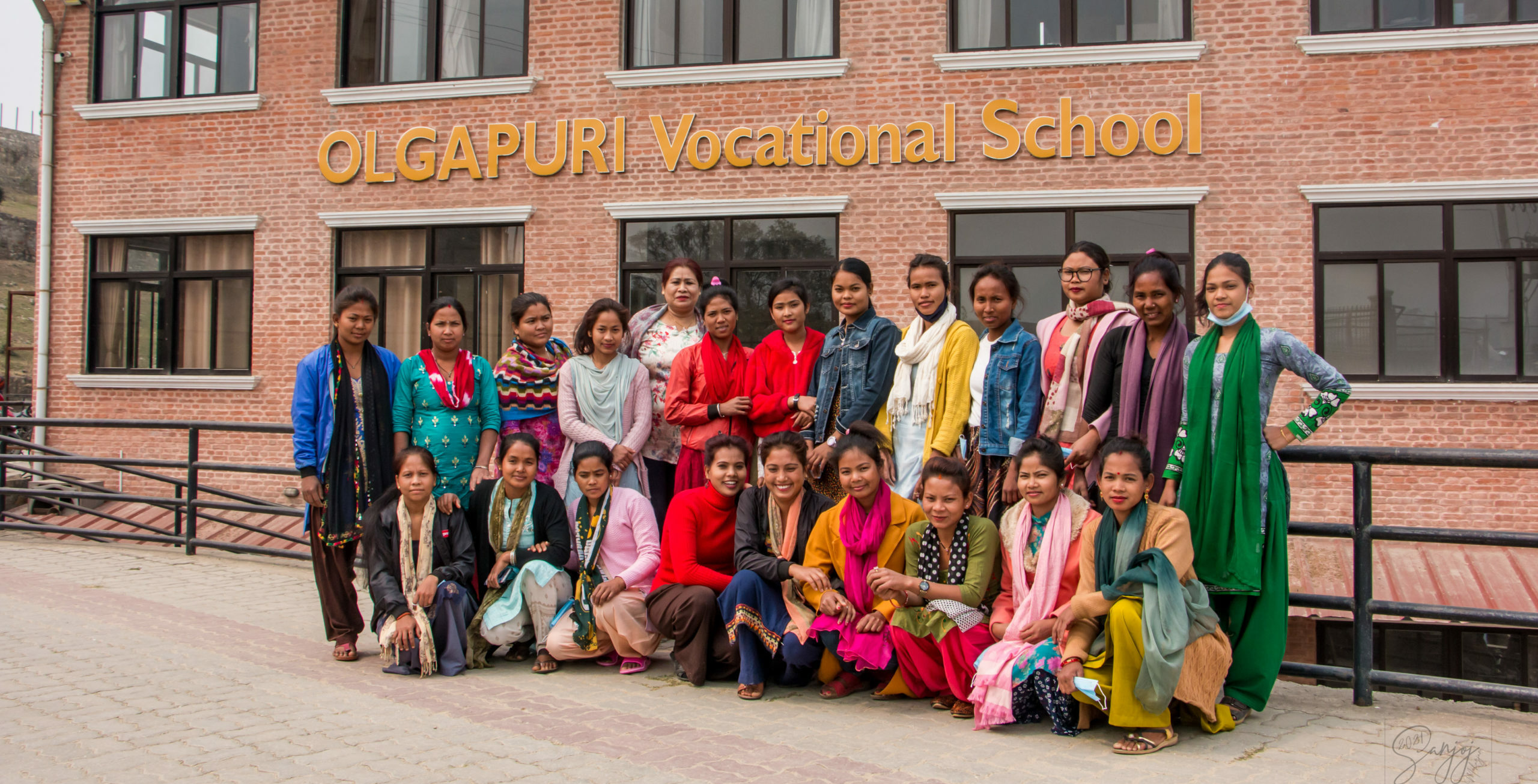
Olgapuri Vocational School
Olgapuri Vocational School (OVS) offers comprehensive training courses in high-demand trades including electrical, plumbing, welding, and carpentry. Young adults in this program receive intensive skills training from expert instructors, entrepreneurship guidance, small business administration and accounting lessons, resume-building and job search support, start-up microgrants, and connections to other young adults on similar paths towards personal economic empowerment.
In normal years, around 90 percent of OVS graduates are employed in their chosen fields within six months of certification. Certifications earned through OVS are recognized in areas throughout Nepal as signifiers of excellence.
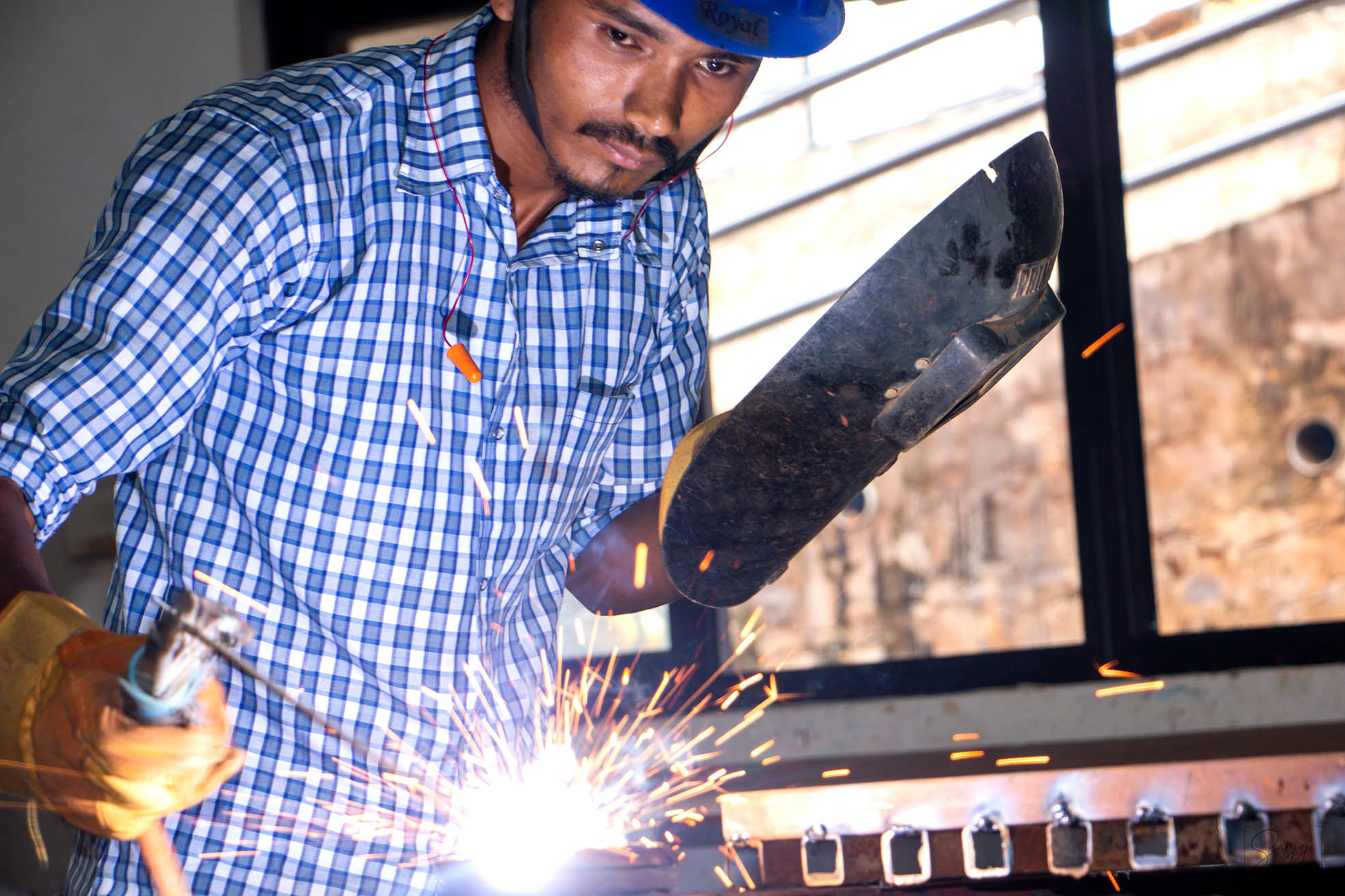
Arjun*, 25, works on an assignment as part of the OVS Welding course. Due to Nepal's dramatic geography and natural resources, wood is more expensive in this nation than other materials. Metal work is a lucrative skill Arjun can put to use in many ways, making this course highly valuable for career options moving forward.
Current Courses
- Welding
- Carpentry & Furniture Making
- Electrical
- Plumbing
- Industrial Tailoring
- SAAET Project (Sustainable Agricultural and Entrepreneurship Training)
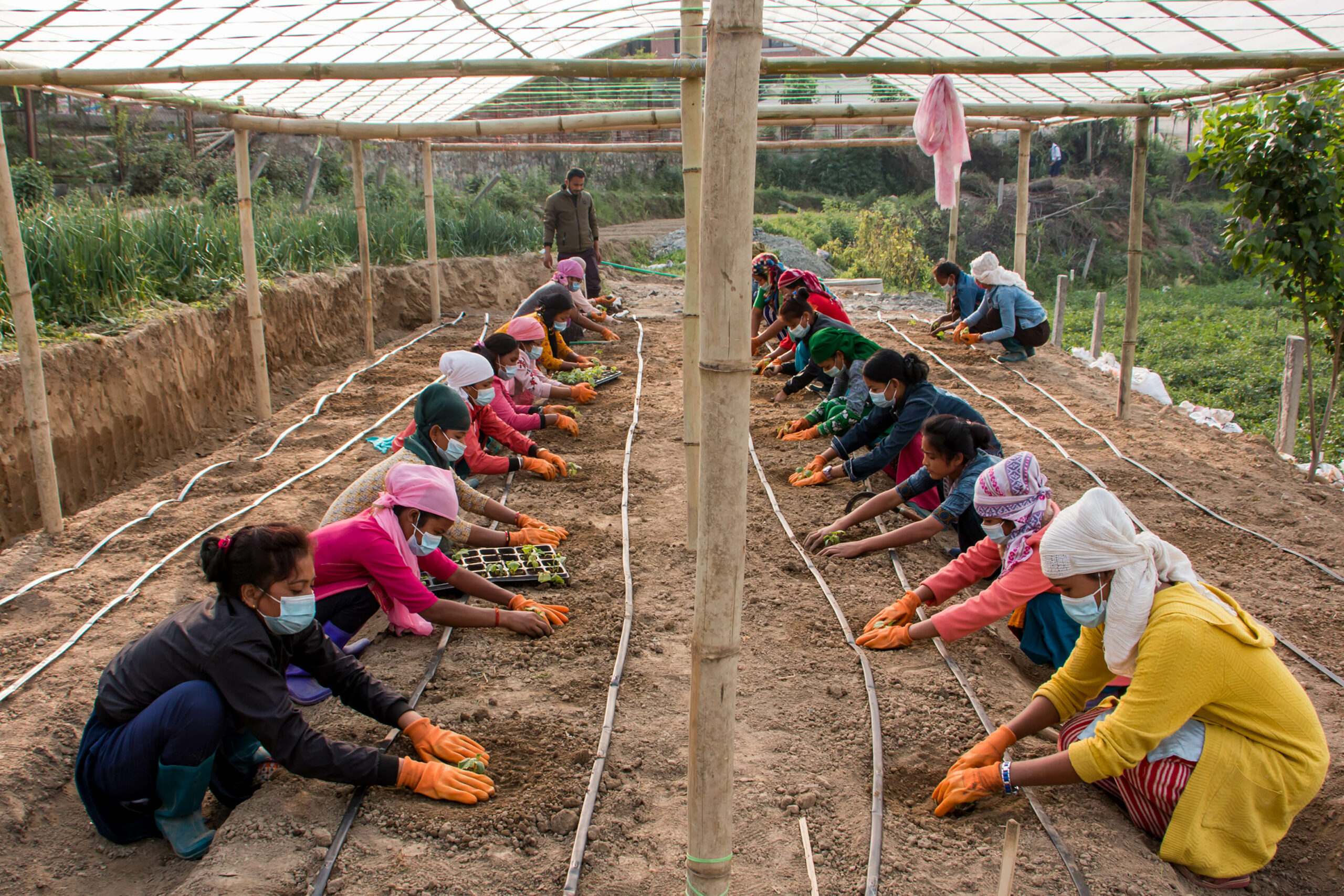
Young women in OVS's SAAET Project (Sustainable Agricultural and Entrepreneurship Training) practice planting together using drip irrigation. They're enjoying working together to learn new technologies, which can be applied quite simply to extraordinary effect. This program is especially popular with young mothers in farming communities.
How We Work
OVS brings 20-student classes of young men and women together for certification programs in skilled trades NYF knows to be currently in high demand. Programs shift to match needs NYF identifies through contacts at major Nepali companies, in discussion with local government officials, and in community organizations.
Construction-related trade courses are almost always available (plumbing, welding, electrical, and carpentry), as work in these sectors is booming with Nepal’s efforts to expand and improve infrastructure nationwide. Specialized courses are also occasionally offered in fields like industrial tailoring or special agricultural topics including unique crops (like mushrooms or henna) and innovations (including greenhouse technology).
Courses are offered at NYF’s Olgapuri Vocational School facility in Kathmandu Valley (with enrollees traveling from multiple communities to attend) as well as in a new “satellite” format on-site in rural communities (establishing hubs of expertise within areas in need of local tradespeople).
Most OVS courses last three months, with different training courses running concurrently. Enrollment in each course typically caps at 20 students (flexibility is applied for satellite courses). All genders are encouraged to enroll, though some programs, like the SAAET Project, are focused on women.
Course work is the core of the program. Activities are split between hands-on instruction and practice (approximately 80% of class time) and theoretical material (20% of class time).
Theoretical elements include relevant course reading, as well as health, first aid, and safety training, entrepreneurship development, and life skills components like goal setting and decision making, communication, basic computer use, and job search skills. Life skills components are provided through Ankur Counseling Center.
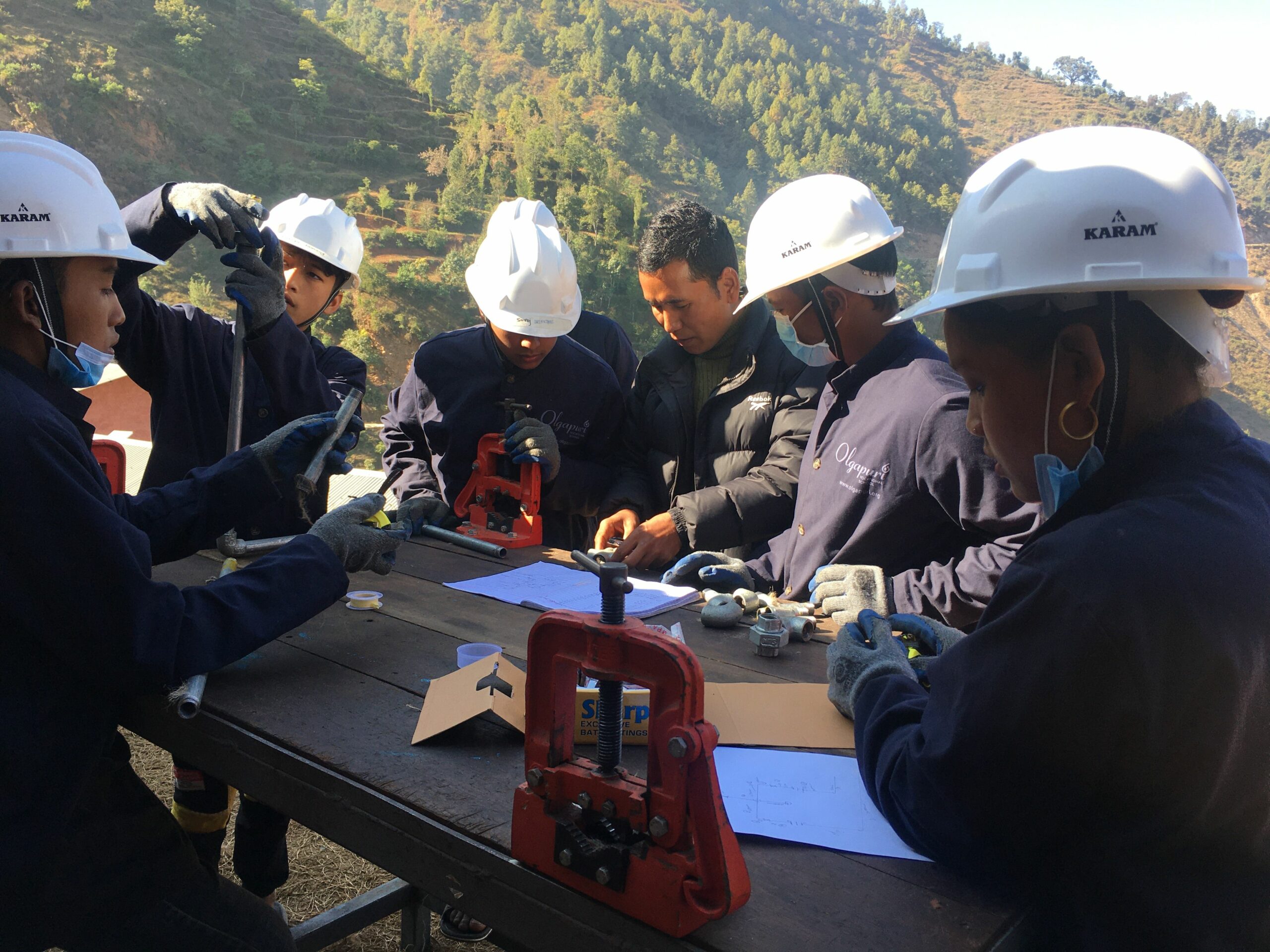
Plumbing Instructor Arjun Lama (center, without helmet) quarantined in this rural hilly village before beginning the OVS Satellite Training course here. Everything about his course is exactly the way it would be on Olgapuri campus - just with a different view! Students listen carefully as Arjun explains the drafting principles they’ll need for their next hands-on assignment. Several of these students will be needed at home once class ends for the day. This was an unexpected benefit of the “satellite” model - the inclusion of students whose families could not spare them for a 3-month training course in Kathmandu.
Satellite OVS Courses
During most of the COVID-19 pandemic, NYF was unable to operate our OVS facility in Kathmandu Valley. However, we knew that as Nepal’s economy suffered during this pandemic, young people throughout the country would need these opportunities more than ever.
In mid-2020, we piloted experimental Satellite OVS courses. Instead of bringing individuals from multiple villages to OVS, we sent our trainers—fully equipped with the necessary tools and equipment—to quarantine in individual villages, conducting the regular 3-month training on-site before moving to another village.
Soon after launching these satellite courses, municipality offices and schools began reaching out to request more. Requests arrived from all over: including a girl’s school, a children’s home, and an addiction recovery center for young adults. The shift was such a success that NYF leadership decided in early 2021 to make OVS satellite courses part of our regular programming. The hope is to scale the program up significantly in the coming years.
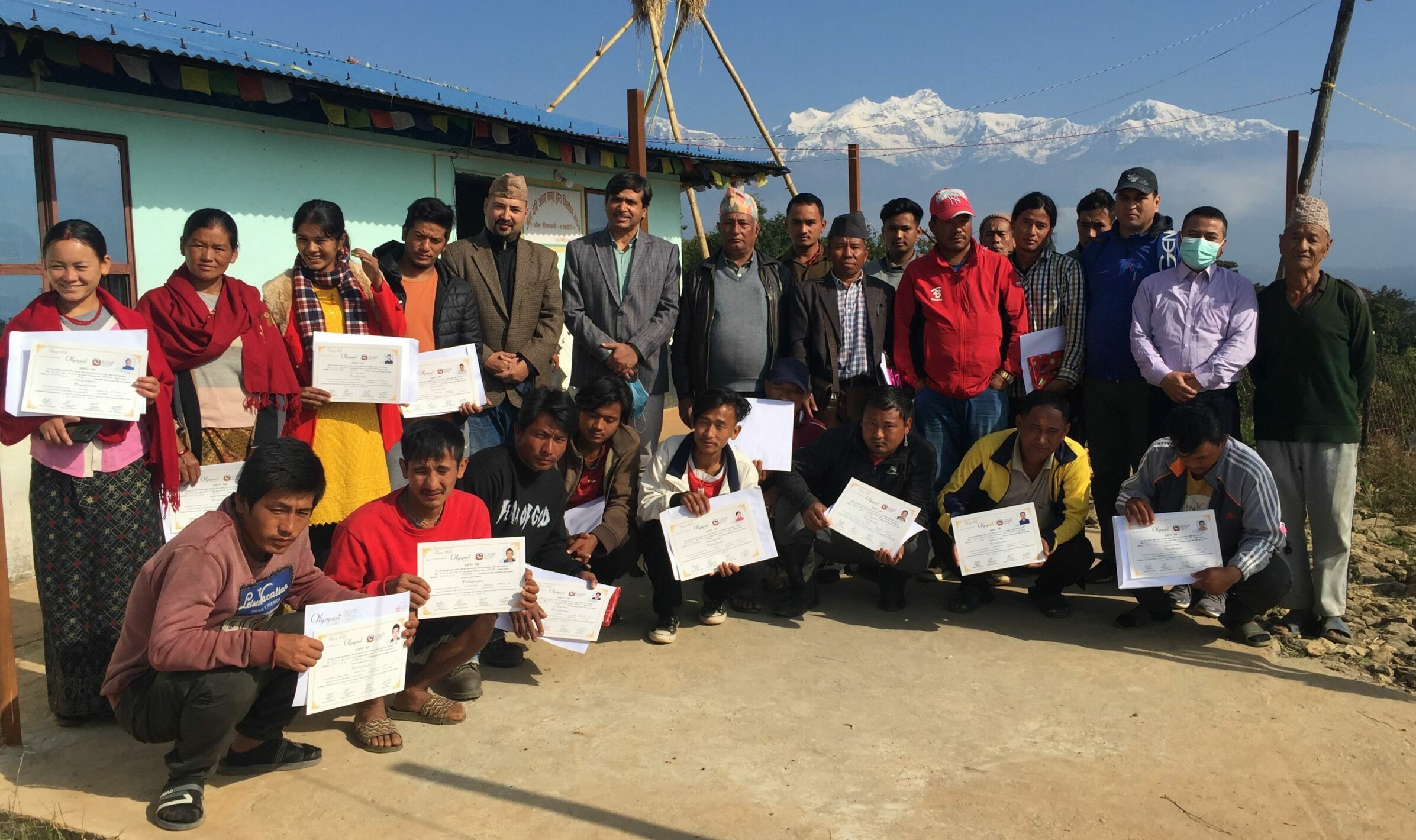
OVS plumbing course graduates pose outside in their home community of Tanahu, in the foothills of the Himalayas. These graduates are about to massively improve the standard of living in their communities by helping neighbors incorporate water tank plumbing at home - improving access to running water for handwashing and more. The coming improvement to community health is immeasurable!
Pradip’s Story
Pradip, 21, grew up in Yangsing, a remote village with only 7 public water taps serving 55 homes. He dreamed of attending college and eventually finding a lucrative overseas job—but due to expense and other obstacles, the dream could not become a reality. Instead, he tried settling in the big city, finding a job as a waiter in Kathmandu as he hustled towards a brighter future. Unfortunately, Pradip’s wages didn’t even allow him to meet his meager monthly expenses. When COVID-19 reached Nepal and the nationwide shutdowns began, a discouraged Pradip returned home to Yangsing.
Then, Pradip’s rural municipality (similar to a rural county in the U.S.) requested an OVS satellite plumbing course for young adults in the surrounding areas—and Pradip signed up, imagining that perhaps this would be the opportunity he had always been searching for.
Pradip took to the work immediately. He took special delight in installing modern flushing toilets, which he had learned to use in Kathmandu. Pradip never tires of hearing his neighbors, who are encountering these toilets for the first time, as they marvel at the way the plumbing works. But best of all, Pradip and two of his classmates have been hired to work on the “One House, One Tap” project in his own home village, bringing safe running water to each of his neighbors.
“It gives me immense joy that the government people recognize my work and offered plumbing work,” Pradip says. “Besides this, people in the village have been coming to me for repair and maintenance work. I am hopeful in finding a lot more work. It feels great to be able to live in my own village and work for the community.”
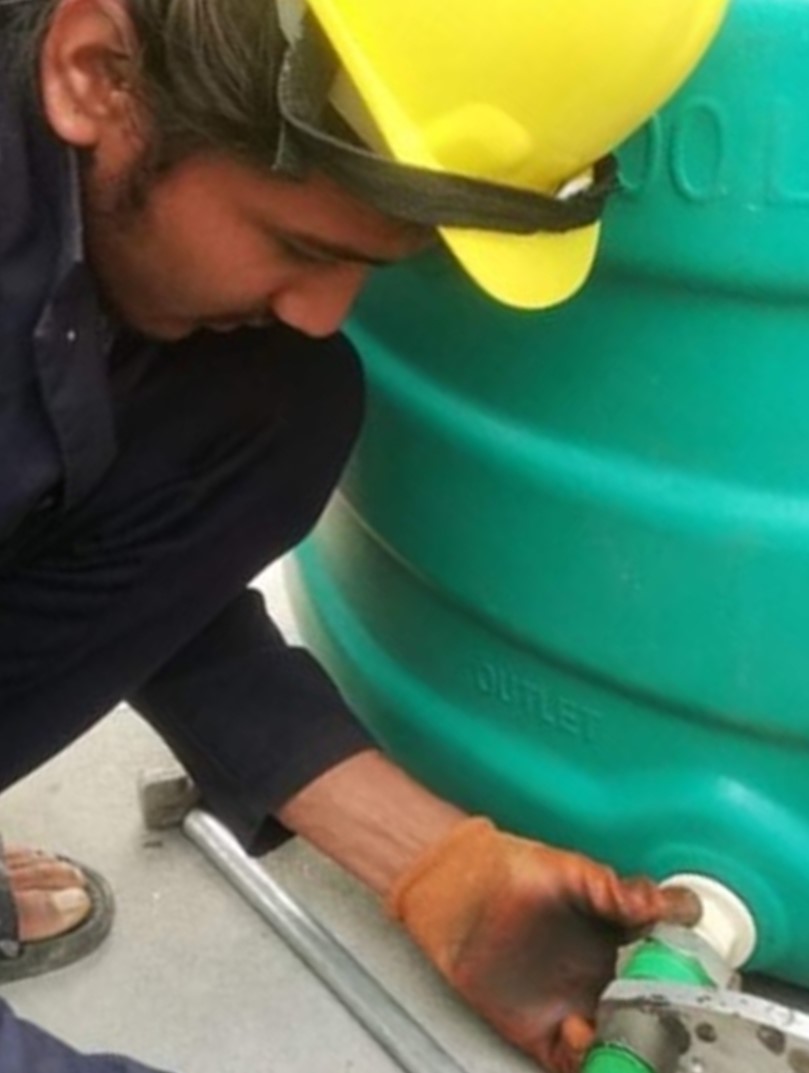
Pradip fits piping to a rooftop water tank. Soon, every home in his village will be linked with a municipal water supply through Nepal's One House, One Tap program, but for now, the homeowner who has hired Pradip will use a simpler gravity-based system for handwashing and toilet flushing.
Welding
This 3-month course, offered on OVS campus and in satellite form for classes of 20, covers the following skills:
- Bench work
- Metal arc welding
- Oxy-acetylene welding & gas cutting
- Planning
- Occupational health & safety
- First aid
- Customer communication
- Field practice (1 month)
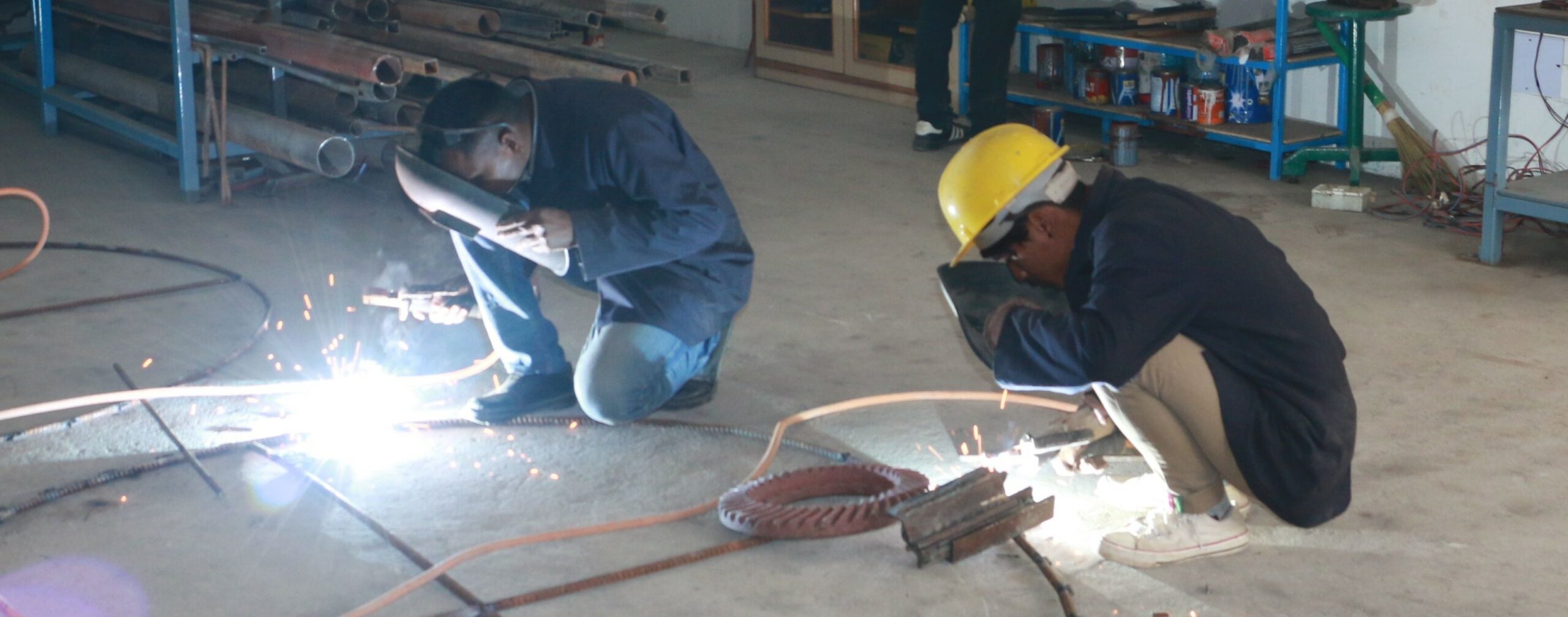
Students at the OVS facility in Kathmandu Valley practice arc-welding on rounded rods. Their course involves one month of field practice to ensure they've mastered the techniques they've learned. Students who travel to OVS in Kathmandu Valley often graduate into high-paying jobs in the city, where there is plenty of room for career growth!
Carpentry & Furniture Making
This 3-month course, offered on OVS campus and in satellite form for classes of 20, covers the following skills:
- Basic mathematics
- Workshop management
- Machine & tools management
- Raw material management
- Structure making
- Molding & hardware fitting
- Furniture finishing & polishing
- Occupational development & communication
- Entrepreneurship development
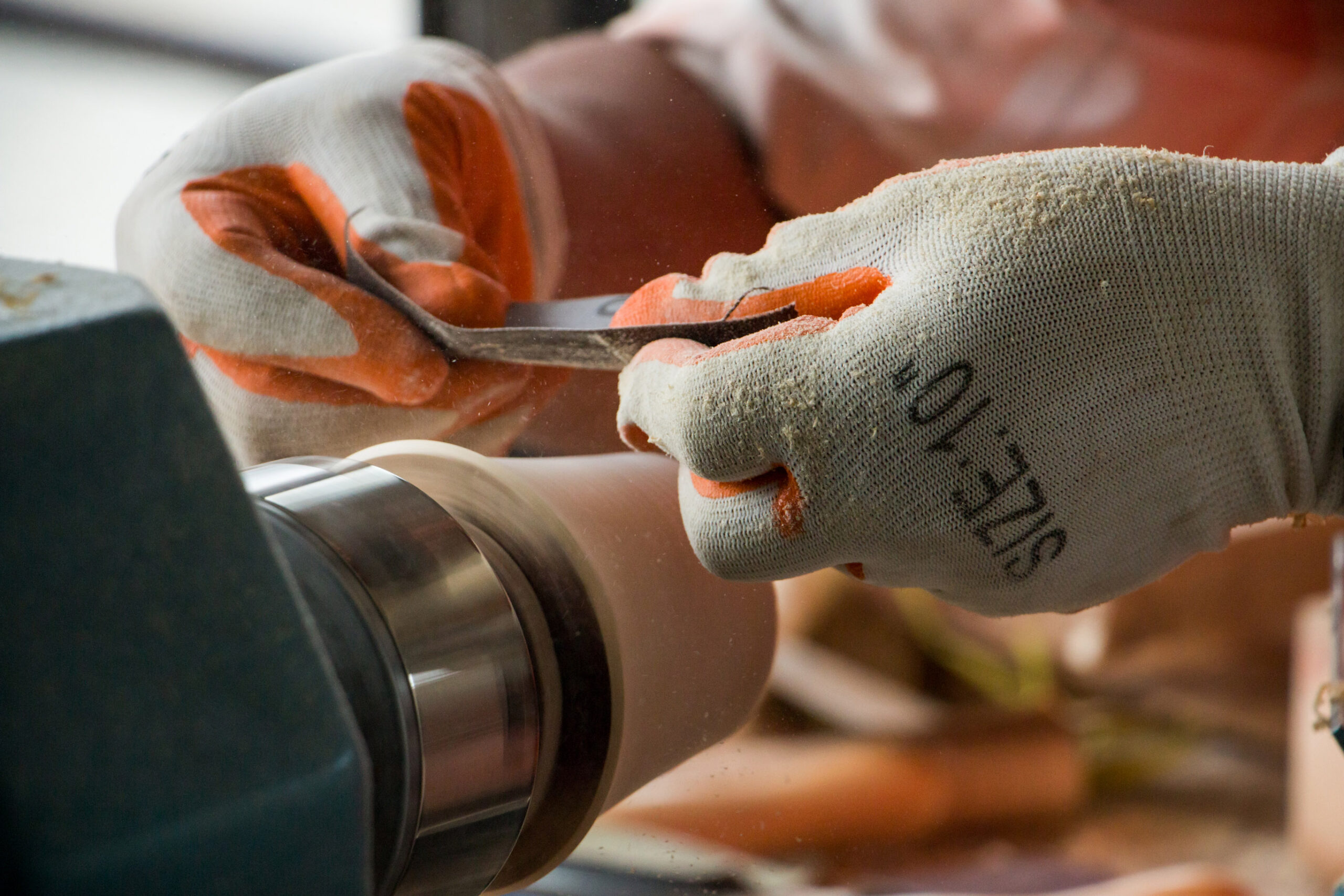
Rajesh*, 22, was working a grueling physical labor job in Malaysia when the COVID pandemic hit. Returning home in early 2020 was hard, as his family relied on his income to make ends meet. When OVS brought a satellite carpentry course to his village, Rajesh signed up and found he has a gift for furniture making! Rajesh and another carpentry graduate have now started a furniture workshop business together and their work is incredibly popular in their local area. With his confidence growing, Rajesh can’t imagine going back to work in Malaysia. His high-quality, well-designed pieces are gaining enough attention that he and his small team are planning to shift their headquarters to the town center, where they can attract even more clients. To his surprise and delight, Rajesh has recently realized that he has become a role model for the teens in his village - an entrepreneur whose work contributes tremendously to the local economy. He is looking forward to seeing how much his business can grow!
Electrical
This 3-month course, offered on OVS campus and in satellite form for classes of 20, covers the following skills:
- Electrical basics
- Occupational health & safety
- Electrical tools & machines
- Basic technical drawing
- Principles of electrical installation
- Wiring techniques
- Safety tools
- Earthing
- Maintenance & protection of electrical installation
- Applied mathematics
- Customer communication
- Entrepreneurship development

Early in the electrical training in Barbardiya Municipality, NYF electrical trainer Mandira Bhandari (front, in orange and brown top) critiques practice fixtures assembled by the students. Electricity in the area used to be extremely expensive, because electricians needed to travel over a day to reach this rural region and be housed and fed for the duration of their stay. Now that skilled electricians live right here in the district, electrical projects are much more affordable - and the local economy is seeing a sudden jump due to contracting wages staying local.
Plumbing
This 3-month course, offered on OVS campus and in satellite form for classes of 20, covers the following skills:
- Occupational safety
- Tools, equipment & materials
- Basic benchwork
- PVC pipe fittings
- Layout planning
- Pipe fitting & valve joining
- Sanitary apparatus & fixtures joining
- Sanitary system repair & maintenance
- Basic repair & maintenance of tools & equipment
- Cost estimation
- Customer communication
- Occupational capacity development & entrepreneurship development
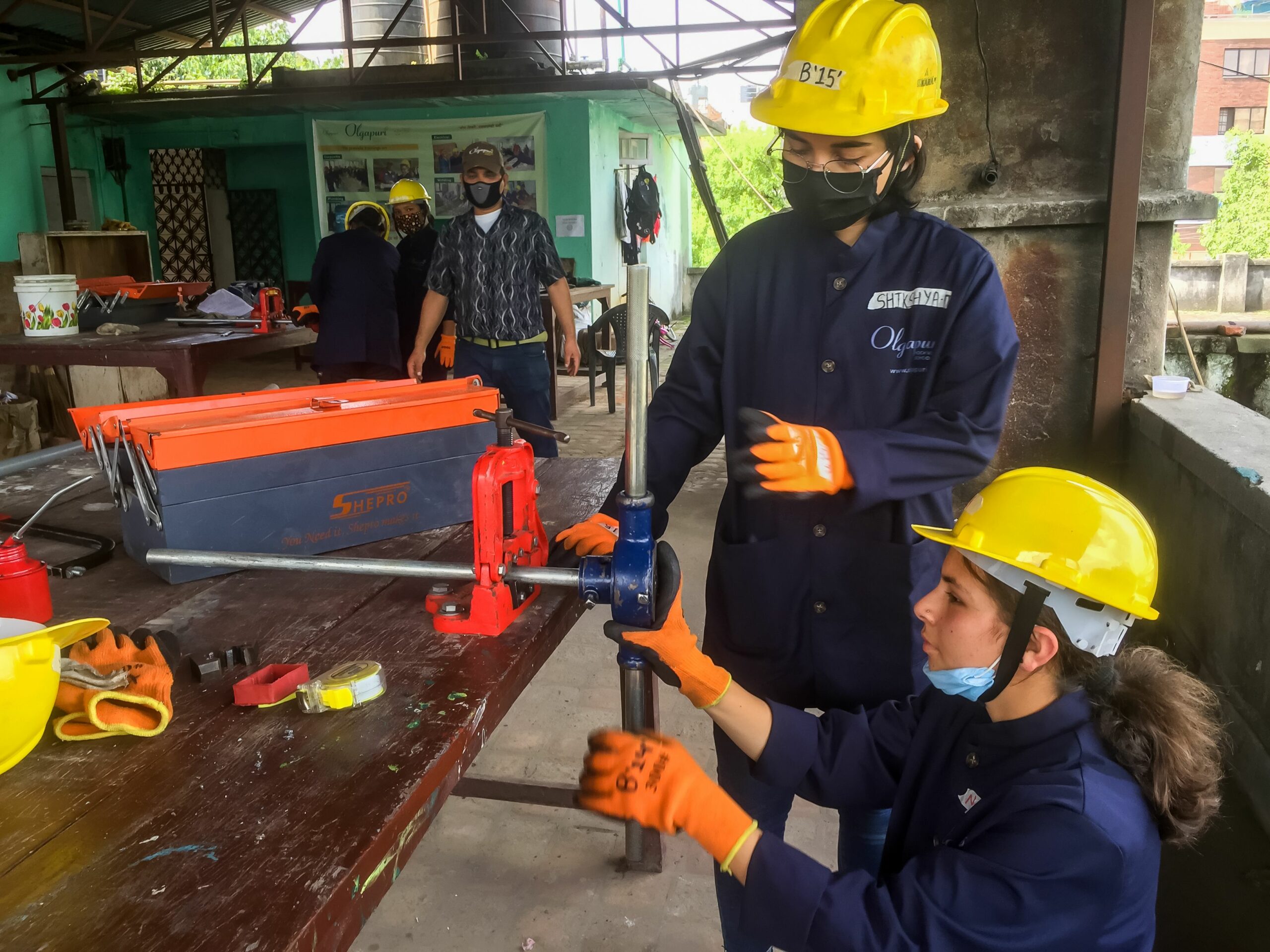
NYF strongly encourages young women to enroll in all trainings offered at OVS, though many choose not to pursue the construction-related programs. These young women, studying plumbing in a satellite course, will unfortunately likely face sexism in their careers - but they are also poised to make good money with the skills they are learning. Graduates from satellite trainings often opt to stay local and work for themselves, splitting their time between helping on the family farm and bringing in additional income from their vocational skills on the side and during times when farming labor is less intensive. For a woman, the ability to make use of a skill like plumbing provides an extra layer of security for times of economic uncertainty, when she may unexpectedly become the sole breadwinner in her family.
Industrial Tailoring
This 6-month course, offered on OVS campus for classes of 20, was specially requested by a group of Freed Kamlaris who hoped that by working together in the garment industry, they would be empowered to enter the workforce from a place of strength and take advantage of the opportunities available in this growing sector.
After 3 months of training in our OVS facility, trainees are hired by a trusted clothing manufacturer to complete a paid 3-month apprenticeship, after which they are hired full-time, earning nearly double Nepal’s minimum wage, with room to grow. For many of our graduates, this is their first experience with a stable income.
As of spring 2022, hundreds of young women are on the waiting list for this course. Garment manufacturers are incredibly impressed with the quality of the work done by our graduates and are eager to employ more. Best of all, these manufacturers know NYF graduates are empowered and encouraged to report unsafe and exploitative conditions, and they know NYF takes such matters incredibly seriously. They are therefore highly motivated to treat their employees well.
The Industrial Tailoring course covers the following skills:
- Industrial sewing machine operation & its parts
- Needle functions & machine speed
- Health & safety considerations, including proper posture during long-term use
- Stitching control
- Stitching types
- Measurement skills
- Cutting fabric panels for clothing items, including fabric grain
- Joining clothing parts
- Shirts & t-shirts, trousers, pants & shorts, track suits, simple jackets, hoodies, gowns
- Goal setting, decision making, positive thinking, self-care
- Tours of local garment companies
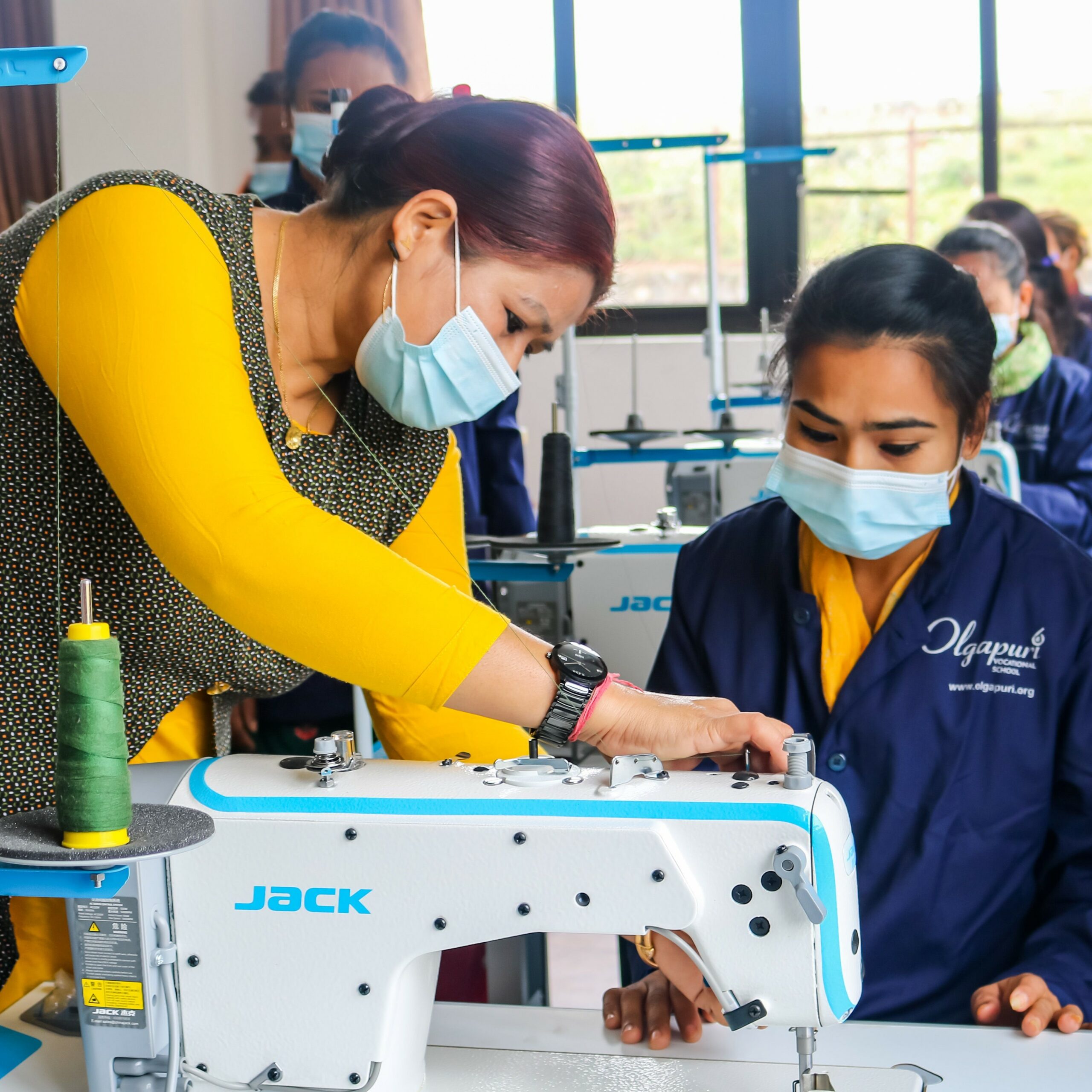
Lead trainer Anju Thapa (left) helps a student solve a threading issue with her machine. "I'm very happy that I'm able to share my knowledge and skills to help these girls," she says. "These girls haven't had many opportunities in life, and now they are brought to our vocational school. I feel fortunate that I'm able to train them. I've worked for 15 years in different garment industries and I've trained others, but I'm pleased I can provide this service to these girls. Everyone here at OVS is very supportive and encouraging. I'm so pleased when our trainees say they've started earning and saving. "
The SAAET Project
This 1-month course, offered on OVS campus and in satellite form for classes of 20, is focused on young women from agricultural communities who wish to expand their economic power without leaving their home communities. (The course is currently being developed in Dang District in western Nepal, with students from the Freed Kamlari community. However, NYF hopes to expand the program into other communities in the coming years.)
The SAAET course is particularly popular with young mothers hoping to improve family nutrition and bring in year-round income without needing to venture far from home.
The program, taught by Nepali experts in green agriculture, involves 15 days of intensive theoretical and hands-on training followed by 15 days of on-the-job training. Materials are provided for each woman to construct her first greenhouse. When the 1-month training program has ended, students are prepared to run their greenhouses successfully on their own.
One year of expert support is included in the program, with contact available via telephone and in-person field visits at the 3-month, 6-month, and 12-month marks. Graduates receive technical support to fully apply the knowledge and skills covered in the intensive training. It also allows trainers to provide personal advice regarding current fair market values, sales and marketing strategies, and more.
Our students’ greenhouses are sustainable almost immediately following the 1-month course, with upkeep of the greenhouse itself more than covered by income from crop sales. Greenhouses allow these young entrepreneurs to grow off-season crops year-round, fetching premium prices at local markets and from wholesalers transporting vegetables to nearby districts. Many of our graduates are able to use financial gains to scale production within their first year following the program.
The SAAET course covers the following skills:
- Introduction to organic farming
- Nursery preparation
- Production & use of organic fertilizers & pesticides
- Construction & use of plastic greenhouse and drip irrigation
- Soil management & line preparation
- Storage & post-harvest loss control
- Budgeting, bookkeeping, business planning & farm management
- Off-season growing & premium crops for maximum profit
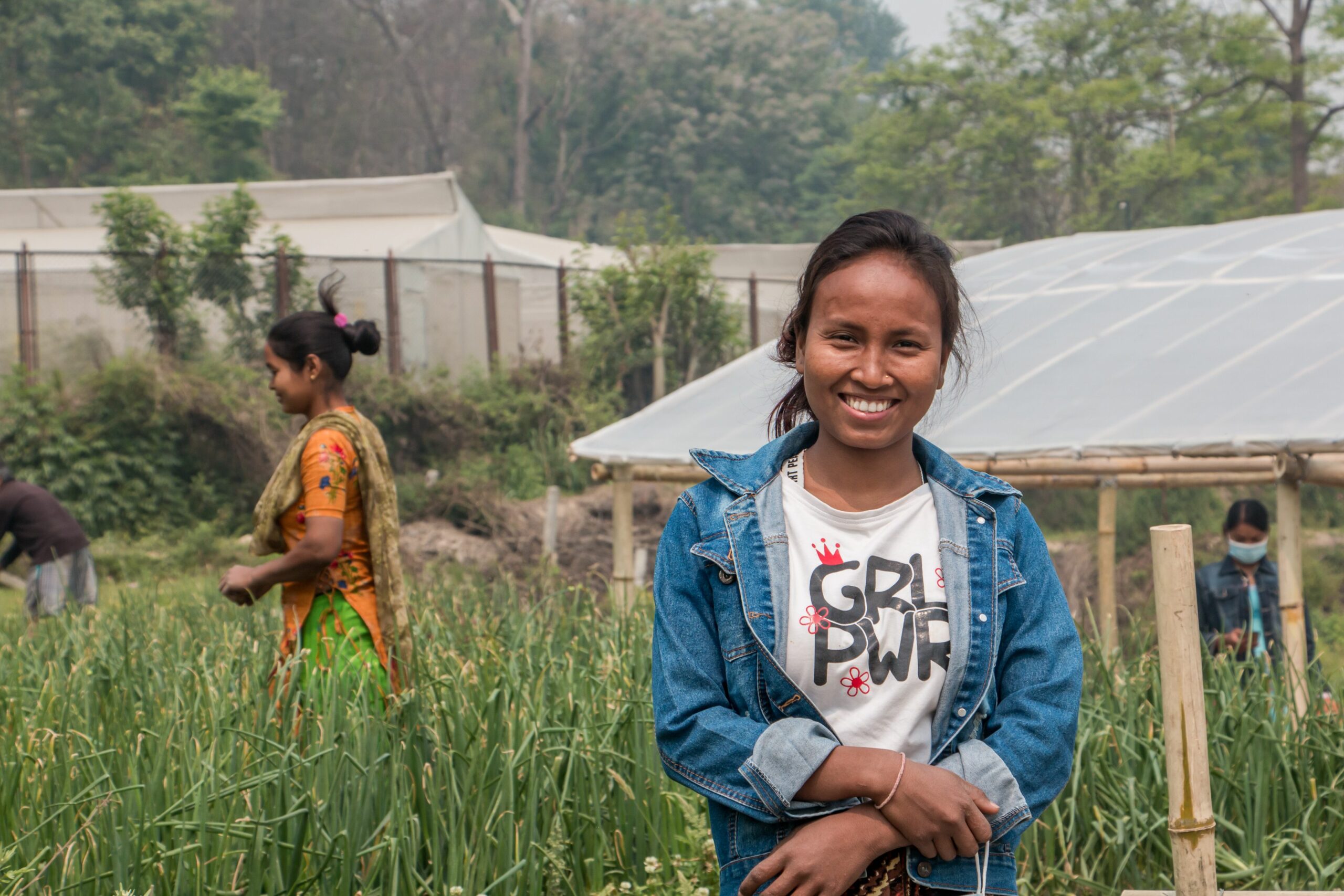
Tanushri*, 24, grins in front of the economical greenhouse model she and her fellow students are building as part of their SAAET training. The structures are simply designed using materials like bamboo and sturdy tarps – but the technology and theory behind them will make an incredible difference in each student’s ability to grow nutritious food year-round.
